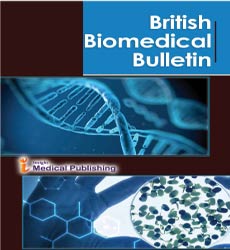ISSN : 2347-5447
British Biomedical Bulletin
Advancements in Synthetic Biology and Engineering of Probiotics
Varusha Pillay Veerapen*
Department of Molecular and cell Biology, University of Cape Town, South Africa
- *Corresponding Author:
- Varusha Pillay Veerapen
Department of Molecular and cell Biology, University of Cape Town, South Africa
E-mail:Varushapillayv@gmail.com
Received date: : July 04, 2022, Manuscript No. IPBBB-22-14496; Editor assigned date: : July 07, 2022, PreQC No. IPBBB-22-14496(PQ); Reviewed date:July 20, 2022, QC No IPBBB-22-14496; Revised date:: : July 27, 2022, Manuscript No. IPBBB-22-14496 (R); Published date:Aug 05, 2022, DOI: 10.36648/2347-5447.10.4.2
Citation: Veerapen PV (2022) Advancements in Synthetic Biology and Engineering of Probiotics. Br Biomed Bull Vol. 10 Iss No.4:002.
Description
Engineered probiotics are the next generation of live biotherapeutics that have been genetically modified to target specific diseases. With the advancements in synthetic biology, the engineering of probiotics has become increasingly sophisticated which has led to the development of therapies for treating cancer, infection, metabolic disorders and inflammation, as well as for diagnosing and preventing them. Herein, we review some of the recent examples of probiotics which have been engineered to target such diseases. Although there are numerous examples of engineered probiotics showing efficacy in animal models, there are no approved products on the market with very few in clinical trials. Therefore, we also discuss a set of features that may be incorporated into engineered probiotics to aid in clinical translation and ultimately, realizing the potential of these bio therapeutics. Probiotics are living microorganisms that confer a health benefit to the host when administered in adequate amounts. Some of the commonly used probiotics are Escherichia coli Nissle 1917, Saccharomyces boulardii, and species belonging to the Lactobacillus and Bifidobacterium genera, such as Lactobacillus reuteri, Lactobacillus casei, Lactobacillus rhamnosus, Bifidobacterium infantis and Bifidobacterium breve.
Functionalization of the Probiotic with Multiple Beneficial Attributes
In recent years, these wild-type probiotics, either individually or in combination, has been assessed in numerous clinical trials against a plethora of diseases ranging from infections and allergies to metabolic diseases and inflammation. Meta-analyses of these clinical trials have shown that probiotics are effective in preventing antibiotic-associated and traveller’s diarrhoea, alleviating symptoms of irritable bowel syndrome, treating paediatric acute diarrhoea, eradication of Helicobacter pylori infection and protection against atopic dermatitis. Although it is seen as a promising strategy to treat different diseases, other meta-analyses have shown that probiotics had no significant effect in managing dental caries, prevention of allergies or treatment of depression and anxiety .The efficacy of the probiotics is both strain and disease dependent, and often, the mechanism of action of the probiotic is unknown, hindering further development of the therapeutic product. Genetically engineering the probiotic strains to target a specific disease may be a promising approach as it enables functionalization of the probiotic with multiple beneficial attributes, depending upon the disease to be targeted. This may result in higher efficacy compared to the wild-type strains. Therapies based on engineered probiotics can offer several advantages over existing therapies, such as cheaper formulations with fewer associated negative side effects.
Advancements Made In the Field of Synthetic Biology
In case of diseases without existing treatment options, engineered probiotics may be a novel method to treat the disease. In this review, we highlight some of the recent examples of engineered probiotics developed to target various diseases. We also discuss a set of characteristics of engineered probiotics, such as safety and regulated expression of the genetic modifications that may be required for the successful approval of the live bio therapeutics by regulatory bodies. Genetic engineering of probiotics is becoming easier with the advancements made in the field of synthetic biology. It is now feasible to reprogram probiotics with increasingly complex functionalities. As such, engineered probiotics have moved from simple design of constitutive expression of therapeutic molecules or enzymes to more complex design that enables the combined use of sense and respond features
Open Access Journals
- Aquaculture & Veterinary Science
- Chemistry & Chemical Sciences
- Clinical Sciences
- Engineering
- General Science
- Genetics & Molecular Biology
- Health Care & Nursing
- Immunology & Microbiology
- Materials Science
- Mathematics & Physics
- Medical Sciences
- Neurology & Psychiatry
- Oncology & Cancer Science
- Pharmaceutical Sciences
